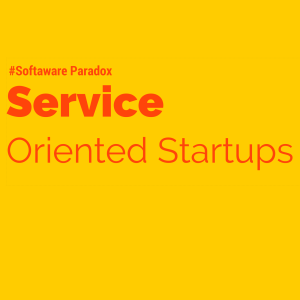Last week a very interesting free e-book called “Software Paradox” was trending on Hacker News. The premise of the  book is, that the value of software as a product is diminishing, but the value of software as an enableris rising. Pure play software companies such as Microsoft and Oracle are fading in comparison to rising stars such as Google, Facebook, Apple, Amazon and newer ones like Uber, Dropbox, GitHub, AirBnB and others. None of the new age companies sell “software”. They all sell a service (or devices, in case of Apple).
book is, that the value of software as a product is diminishing, but the value of software as an enableris rising. Pure play software companies such as Microsoft and Oracle are fading in comparison to rising stars such as Google, Facebook, Apple, Amazon and newer ones like Uber, Dropbox, GitHub, AirBnB and others. None of the new age companies sell “software”. They all sell a service (or devices, in case of Apple).
The book goes on to argue that companies even prefer giving away their software innovations as open source so that they can get the respect of the developer community that they desperately want to attract. Apple’s operating systems are based on an open source flavour of Unix, GitHub has built a social layer on git, a version control system created by Linus Torvalds and Facebook is a leader in new age open source web development tools. So there is a clear trend of companies collaborating on an infrastructure and tool level and yet being able to create a lot of value in the services they provide.
They book suggests what pure-play software product companies should do in order to survive this next wave. There are a lot of great options described which range from moving to a subscription model to becoming a full-stack startup (doing very deep vertical integration in the markets they operate). In the context of pure play software product companies, where do we in India stand?
—
A defining moment in the first episode of the new YouTube drama TVF Pitchers, an Indian take on the popular and brilliant series from HBO, “Silicon Valley”, is when the protagonist is about to dump his entrepreneurial dream and continue with an overseas posting. On his way to the airport, he sees large advertisements of Housing.com and Snapdeal and decides that his calling is a startup. On a side note, it is interesting to observe that the innovation described in TVF Pitchers is a “B-plan”, whereas the innovation on which HBO Silicon Valley is based, is a hypothetical “algorithm”.
My conclusion is that India has already leapfrogged to “Service-Oriented Startups”. The number of new startups and deals in the e-commerce and classified marketplaces domains greatly out numbers startups that have a technological innovation at the heart of the business. The aspiration of the entrepreneur who starts up today is to build the next Flipkart, not the next Google.
This is something we all will have to learn to accept. Like so many modern innovations we love using today are ones we did not invent, software is something we will rather use. Innovating on technology requires an intellectual rigour and ecosystem support that will probably never reach a critical mass in India. But amidst all this gloom, I still have hope that at least a few of the 3 million software developers out there will prove me wrong.













